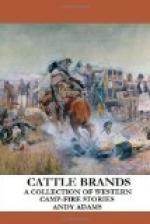“Before half an hour had passed, we were aware that we were pursued. We threw off the road at right angles and rode for an hour. Then, with the North Star for a guide, we put over fifty miles behind us before sunrise. It was impossible to secrete ourselves the next day, for we were compelled to have water for ourselves and stock. To conceal the fact that our friends were prisoners, we returned them their arms after throwing away their ammunition. We had to enter several ranches during the day to secure food and water, but made no particular effort to travel.
“About four o’clock we set out, and to our surprise, too, a number of horsemen followed us until nearly dark. Passing through a slight shelter, in which we were out of sight some little time, two of us dropped back and awaited our pursuers. As they came up within hailing distance, we ordered them to halt, which they declined by whirling their horses and burning the earth getting away. We threw a few rounds of lead after them, but they cut all desire for our acquaintance right there.
“We reached the river at a nearer point than the one at which we had entered, and crossed to the Texas side early the next morning. We missed a good ford by two miles and swam the river. At this ford was stationed a squad of regulars, and we turned our prizes over within an hour after crossing. We took a receipt for the men, stock, and equipments, and when we turned it over to our captain a week afterwards, we got the riot act read to us right. I noticed, however, the first time there was a division of prize money, one item was for the capture of four deserters.”
“I don’t reckon that captain had any scruples about taking his share of the prize money, did he?” inquired Gotch.
“No, I never knew anything like that to happen since I’ve been in the service.”
“There used to be a captain in one of the upper country companies that held religious services in his company, and the boys claimed that he was equally good on a prayer, a fight, or holding aces in a poker game,” said Gotch, as he filled his pipe.
Amongst Dad’s other accomplishments was his unfailing readiness to tell of his experiences in the service. So after he had looked over the camp in general, he joined the group of lounging smokers and told us of an Indian fight in which he had participated.
“I can’t imagine how this comes to be called Comanche Ford,” said Dad. “Now the Comanches crossed over into the Panhandle country annually for the purpose of killing buffalo. For diversion and pastime, they were always willing to add horse-stealing and the murdering of settlers as a variation. They used to come over in big bands to hunt, and when ready to go back to their reservation in the Indian Territory, they would send the squaws on ahead, while the bucks would split into small bands and steal all the good horses in sight.




